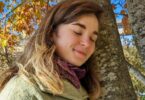Penelope Evans
[mks_dropcap style=”letter” size=”52″ bg_color=”#ffffff” txt_color=”#000000″]S[/mks_dropcap]ome kid thinks he saw poison hemlock up the trail, a good twenty-minute hike from the cabins. So I’m up there looking, even though I know there’s no poison hemlock around here, hasn’t been any in years, everyone who works at the camp knows this and I worked here last year, I know every plant around the place. But Marcia—the camper safety marshal—says if some kid thinks he saw poison hemlock, we gotta check it out so someone can put a sign up. It’s not like the kids are supposed to be eating anything out in the woods anyways. What, are they gonna hike up the trails and just start snacking on random leaves?
There’s poison ivy on the north side of the camp, up the hill. Seems like it should be a larger item of concern. I raised this point in the office. Marcia gave me a look.
“Yes, but we know about the poison ivy,” she said. So I’m off up the trail. About four minutes into the walk I stopped being annoyed and started being happy about it, because I’d rather be hiking than working. You get to a point where you think: if I have to make one more friendship bracelet, I’m gonna saw my own arm off.
That’s what being close to nature feels like. I love it. And I hate it. That’s why I decided to work at the camp for a second summer. I wouldn’t go outside this much if I wasn’t getting paid for it.
The hike’s uphill for the first fifteen disgusting, sweat-soaked minutes. And then downhill the rest of the way. The camp property slopes down to some hazy line where the historical preservation society owns part of the woods and the field. As the trail loops around it leaves the camp property and crosses over for a while.
Around that loop I keep my eyes open for poison hemlock, but there isn’t any. Not even fennel or miner’s lettuce (its closest lookalikes).
And then, just off the trail, in the field, I see her. The sun is beaming down on her face and she is radiant, haloed in brown curls, looking at me in mild surprise, as if the last thing she expected was for a girl in a grubby red Camp Huron shirt and mud-coated hiking boots to emerge from the underbrush. In order to seem less odd (hopefully) I wave. She waves back. She’s dressed in historical garb—a pretty pink fitted dress, pioneer-style, and she’s holding a basket, as if she is perhaps a wayward time traveller, stalled for the moment in the field that neighbours the summer camp.
“Hi,” I call.
“Hi,” she calls back. I step off the trail. She steps towards it. We meet in the middle. I’m blushing, I can tell, that full-body blush that runs past my face all the way to my neck and shoulders, made only bolder by the way my black hair frames my face. But it’s sunny, and hot, and the summer’s tanned me a lot, so maybe she won’t notice or care.
“Sorry, I’m just up here looking for poison hemlock,” I say.
“Why are you sorry?” she asks.
“Uh, for startling you. And trespassing I guess.”
“It’s not like I own the historical preservation society. I just work here,” she says. I laugh awkwardly. What the hell am I even saying? Up this close, I can see a spatter of freckles on her oak-brown skin.
“Did you find any?” she asks.
“What?”
“The stuff you were looking for. Poison hemlock.”
“Oh. No. Some kid thought he saw some but … probably not. I work at the camp.” I jerk a thumb over my shoulder, the way I came, to indicate. She nods.
“Is that stuff really bad?”
“It’s okay for a summer job, I think,” I say, and realize my mistake even before she laughs.
“No. Poison hemlock. Is it like poison ivy?”
“Right! No. It’s fine, it’s just poisonous if you eat it. No one should be eating stuff in these woods anyways. Unless they’re a trained camp counsellor. Like me.” I’m an idiot.
“Well, I hope you don’t find any anyways,” she says. I nod.
“I better get back to camp,” I say, and turn around, start for the trail with my face still burning.
“Hey, I’m Jodi!” she calls after me.
“I’m Natalie Nguyen!” I call back. As soon as I turn away I shut my eyes for a second. Why’d I say my full name if she didn’t say hers? I’m an idiot. The short uphill hike before the downhill back into the camp feels sweatier than usual, but maybe it’s the hour, some time around two-ish, when the sun burns hardest.
And so I get back and I tell Marcia I was right about the poison hemlock thing but that’s sorta old news by then, because you leave camp for five minutes and newer, more exciting problems always spring up before you get back, but that’s the job, you know? And that night I shut my eyes and think about Jodi the historical re-enactment girl, standing in the field like a painting. I figure I’ll never see her again.
And then Tuesday rolls around. On Tuesday I take the kids for a hike out to the pond. Dunno why they need to be seeing a pond when we’re right on the lake, but it was at the behest of Marcia, with whom arguing is pointless. To hike out there we ended up at the loop in the trail where the supposed poison hemlock was sighted and even as I’m remembering meeting Jodi out there I spot her, as if my imagination has conjured her back. Or rather, one of the kids spots her, and points.
“Hey, pioneer dress-up people.” Jodi is standing among the wildflowers with a small gaggle of kids in similar outfits and she is pointing out to them some kind of plant or animal or insect in the tall grass. At my kid’s shout, she looks up, breaks into a smile, and waves.
“Jodi,” I call.
“You know her?” a kid at my hip named Simon asks. I nod absently. Our two groups meet in the middle of the grass.
“Were there actually black pioneers?” one of my kids asks.
“Jake!” I say. Jake looks at me like he was somehow legally obligated to ask that.
“There actually were,” Jodi says.
“Your dress is really pretty,” another of my kids says.
“Do you teach them how to churn butter and stuff?” I ask.
“We do all kinds of historical activities,” Jodi says. “Would the kids at your camp be interested in coming down sometime?” she asks. “Because we can set up group tours at discount rates,” she adds, as if remembering some distant boss’s words.
“Yeah. I bet Marcia would go for that, actually,” I say. She smiles. “We’re going to the pond,” I add, helpfully.
“Do you guys fish in there?” one of the historical kids asks.
“No. You can’t fish in the pond,” one of mine snaps back. We split the groups before some kind of turf war ensues. When I look back over my shoulder, Jodi waves to me. I wave back to her.
“You’re red all over, Nat,” Jake says. I wish I could kick him just a little bit.
◊ ◊ ◊
I don’t know much about impressing girls. Like, heck, I don’t know much about anything. I work at a summer camp. I’m eighteen. Eighteen-year-olds don’t know anything, in my experience. Aside from making her a friendship bracelet (which, along with being embarrassing, might not so much send the message I want to send) there’s not many options. Here’s what I came up with: catch her a fish. It’s not great, you know, but it’s sort of the best I got. I don’t even know if Jodi likes fish, but it seems to be to be worth a try.
So I convince Marcia to let me take some kids to the fishing spot on the north side. We have to be extra careful, because of the poison ivy. I spend all Wednesday trying to catch something. I come up empty-handed. Well, not exactly empty-handed, but a few pickerel aren’t going to impress anyone. I’m hoping for a largemouth bass or a trout or … something I can show off.
On Thursday, it rains. Just as well, because I’m thinking the fish plan is pretty stupid. Also, I’ve lost all my courage. I moan to Marcia about my ailing confidence. She tells me to buck up and pull myself up by my bootstraps and hold my head up and a bunch of stuff like that. Then she sends me off to supervise more friendship bracelets. I tell a few of the kids about my fish plan. They unanimously endorse it. Maybe I’ve been up here too long, but I really value their opinions.
So on Friday, I head up to the fishing spot again, this time with only four kids, ones that are pretty advanced fishing-wise. I get a bite, a strong bite, something that’s gotta be big like a trout or that bass I was hoping for, but my line breaks, and it evades me. On the way back I kick a tree and one of the kids threatens to tell on me to Marcia about my defacing nature.
On Saturday I go up to the lake alone. It’s thick humid, the kind of weather that makes you feel like you’re underwater. The cicadas are so loud it’s like the roar of a flood against closed doors. And I wait for hours, even when the sky clouds over and blocks out the sun. The fish is out there, and I will catch it.
And I do catch it, seconds before the rain, when the first drops have begun to fleck my cheeks. The line goes tight, and my hands tingle, and I feel like the valves in my heart are pressing closed, because I really don’t want to mess it up, I really want to catch this one. Splash, as the fish breaks the water, not the bass or the trout I expected but a salmon, a beautiful Chinook salmon, with a brush of pink across its underbelly and sharp green fins. It’s huge, got to be almost twenty pounds. It’s the biggest fish I’ve ever caught. I carry it back to camp in kind of a hurry.
Simon and this kid Marcus and this other kid Katie are all sitting on the single step outside one of the cabins when they see me coming.
“You caught it!” Simon yells. Katie stands up so fast the book on her lap falls on the ground. Marcus gapes.
“Nat caught the fish!” Katie yells into the cabin. Three more kids emerge in the doorway, peering out at me.
“Go give it to her,” one of them says.
“To who?” Marcus asks.
“Jodi, the pioneer lady,” Simon says.
“Natalie caught the fish for her,” Katie explains. I don’t know how I should be responding to all this, so I just heft the fish once. It’s heavy, and still dripping a little. What’s the protocol for giving a girl a fish? I should probably put it in a cooler. This is what Marcia advises when she emerges from the camp office, towed by small kid named Imani.
“If you’re giving her a fish at least put it on some ice,” she says. Cole, one of my fellow counsellors, agrees.
“It’s almost big enough to be a trophy fish,” he says.
“But it’s a salmon, you should eat it,” Aliyah, another counsellor says. These are all good points. We put the salmon in a cooler with some ice from the kitchens and then some of the kids and I start up the trail towards the loop where we meet the historical preservation property. And the sun has come back out from behind the clouds, so I’m sweating, but I don’t think it’s just sun. My hands are slick where they’re holding the cooler and I’m thinking: what if she’s not there? What if she hates fish? What the hell am I doing? But I have a crowd with me. It’s not like I can stop now.
So we hike up and then the downhill slope and we break through in the field and there’s no one there. We glance around.
“Should we go over there?” Simon asks. He’s holding his compass, and his glasses are askew for some reason. Simon is one of those kids who pulls his socks up too high and forgets to rub his sunscreen in so it leaves white streaks on his face. But he’s buoyed by the confidence kids have and I don’t, and he looks towards the mock village like he’s not scared to charge in there. I hesitate.
“Yeah, okay,” I say. So we start across the field, and I glance back over my shoulder towards the path we’re leaving when Katie shouts.
“Look, it’s her!” and I look, we all look, and there she is, Jodi in a blue pioneer dress with a white apron and she’s looking at all of us in utter surprise. With her are five kids in a mix of historical and everyday clothes and she’s holding a little basket with a cloth over it. We meet by the trees on the other side of the field, so we’re in sight of the mock village, and we can see the path the horse-drawn hay-cart tours wears, and the white painted porch of the schoolhouse, and the little ice cream shop that’s less historical and more for tourist money.
“I was going to come up to the camp, to talk about … that tour for the camp kids,” Jodi says.
“That’s what I came down for,” I say quickly. She looks down at the cooler. I look down at the basket.
“I made you some bread,” she says.
“I caught you a salmon,” I say. A moment of odd, thoughtful silence follows. And then Jodi laughs, and I laugh, and she takes a step closer and I take one too and I bite my lip and wish for more confidence, just a little more.
“I leave my phone in the office when I’m working. But if you wrote down your number, maybe I could text you,” she says. I blink at her, and I see that terror ghost through her eyes, when you’re making your best guess and praying you’re not wrong, so I just about drop my cooler on the ground, and I take her hand even though mine are sweaty. She squeezes my fingers. It feels like my heart’s been blocked for days and now blood is flowing like water over rocks in a stream.
“I don’t have any paper,” I say. “But I will. I for sure will,” I say. She smiles. I smile. “I like you,” I say, to my own deep embarrassment.
“I like you too,” she says, like we’re in grade eight suddenly. I wanna kiss the back of her hand, but with all the kids watching, that might be awkward. So instead I give it another squeeze, and she squeezes back, and we trade items. She takes off with the cooler and the salmon (which she admires charitably) and I take off with the basket and the bread (which is genuinely amazing, no need to fake being impressed) and we split up and head back our separate ways.
On the uphill hike back to camp, Katie and Simon and Marcus exchange several looks.
“Jodi,” Simon says, establishing the topic.
“Do you like her like her?” Katie asks. Marcus picks up the pace to not be left out of the conversation. I look down into the bread and try to decide if one of these kids will tell their parents and if it’s possible for me to lose my job and I figure, hmm, probably not, and besides, I’m pretty sure it’s illegal for the camp to fire me over this.
“Yeah,” I say. “I like her like her.” Marcus, Katie, and Simon and the other kids oooo. It’s like I’m in grade six or something. And I can’t stop grinning.
 Penelope Evans writes every day and works as an editor at her college newspaper, the UC Gargoyle. She’s a specialist student in sexual diversity studies in her third year, and a novelist in her free time. In secondary free time she writes short stories. Expect her upcoming thesis on sonic fanfiction in the 21st century.
Penelope Evans writes every day and works as an editor at her college newspaper, the UC Gargoyle. She’s a specialist student in sexual diversity studies in her third year, and a novelist in her free time. In secondary free time she writes short stories. Expect her upcoming thesis on sonic fanfiction in the 21st century.






